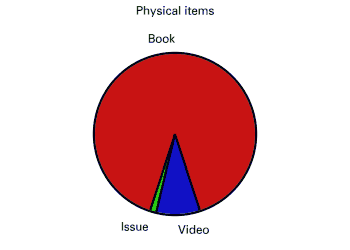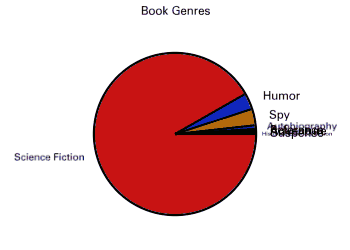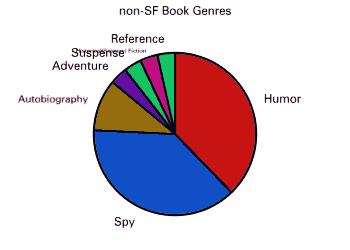Some statistics on my collection
...or at least the part that's been entered into the database so far.
This is a long page (that used to be even longer, but it will grow again) divided into sections. Here are links to go directly to each section:
The statistics on this page are for all the items in the database.
Total counts by item type

The table below lists the actual counts of each type of item in the database and the explanation of what that type is. Some entries represent a physical object (e.g. a book), and some are a logical subpart (e.g. a story in a book that is a collection of stories). The pie chart shows the fraction of each type of physical item. At the moment this is a little biased since I've done a more thorough job cataloging the books.
|
Genre
Most of my collection is Science Fiction, with a smattering of other genres. This table lists all the genres I've cataloged by the type of item and a total number of items. [Querying the DB right now, there are 11 things with no genre listed (last I checked, these were all articles, I haven't really decided, yet, how to do a genre classification for articles). These are, therefore, not counted in the table below. Thought I'd mention that, just in case you got inspired to add up numbers and see that the totals below don't match the above table. But, other than the articles everything should match up.]
One difficulty that I had when marking genres is that I set the database up to have a single genre for each item. That made it difficult when I came to, for example, Science Fiction Mysteries. I could have set up a special genre for each combination, but what I did was just mark them as the main genre (usually SF). I've been thinking about making the DB more generalized to support some items with multiple genres, but these are a small subset, and doing that is a lot of work. So, it gets put off...
|


These two pie charts show what fraction of the books are each genre (i.e. the first column of the preceding table, because that's the most interesting). The first pie chart shows the total graphically. But, the non-SF categories are hard to see in that, so there's another that just shows the non-SF Genres...
If you have any suggestions for other stats that might be interesting, feel free to contact me and suggest them. Special attention will be paid to suggestions that come with good descriptions of how to determine them (i.e. algorithmic description).
![[Open Source Iniative] [Open Source Iniative]](http://www.opensource.org/trademarks/opensource/web/opensource-75x65.png)
![[Self professed Hacker] [Self professed Hacker]](/img/glider.png)